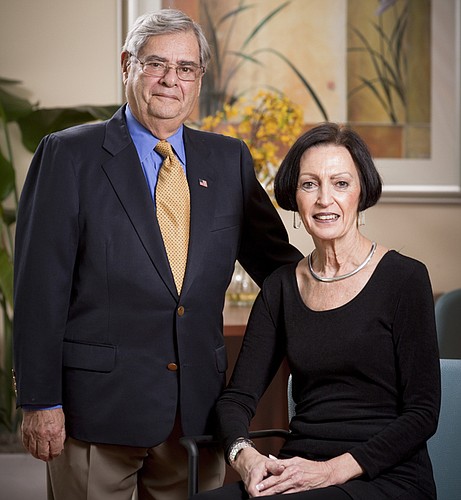- November 25, 2024
-
-
Loading

Loading

Retired Washington, D.C., lawyer Larry Hoffheimer long sought to mitigate risk for clients.
Yet his new venture is a six-figure gamble that he can successfully help people with Parkinson's disease get more out of life. Hoffheimer's novel approach, through a Sarasota-based nonprofit he founded, Parkinson Place, differs significantly from traditional methods that focus on medical treatment and scientific research.
The idea behind Parkinson Place is to provide a community center open to anyone with Parkinson's, a chronic brain disorder that can lead to tremors and difficulty moving. The center, which Hoffheimer says cost about $100,000 to open, offers free classes, lectures and seminars, on topics from voice aerobics to dancing with Parkinson's. It also offers daily camaraderie, both for people with Parkinson's and their caregivers.
“There is no destination site like this anywhere,” says Marilyn Tait, executive director of the Parkinson Research Foundation, a Sarasota-based nonprofit that oversees Parkinson Place. Tait has worked in the Parkinson's field for 15 years. “We really push education and awareness.”
Tait and Hoffheimer's long-term vision is to build a franchise-like expansion model, where Parkinson Place can be duplicated outside the Sarasota-Bradenton region. “Other communities will want to have similar Parkinson's destination spots,” Hoffheimer says. “The exhilaration and acceptance we have gotten in the (Sarasota-Bradenton) area is both motivating and gives us validation.”
Parkinson Place opened in September, on the first floor of a two-story office building off Bee Ridge Road, just west of Interstate 75. The 7,500-square-foot office was previously a cardiac research center.
Tait and Hoffheimer say a place like Parkinson Place fills a void in the medical community. The center also has a dual purpose, says Hoffheimer, in that it gives potential donors to the Parkinson Research Foundation a tangible focus-point for giving. An edge like that is crucial in the competition to grab fundraising dollars.
“There are a lot of Parkinson's organizations that have been around for 50 years,” says Hoffheimer. “Plus, there is also Michael J. Fox, who has raised millions of dollars.”
Adds Hoffheimer: “I had no bait.”
Parkinson Place is now that bait. The glistening facility is designed with a Zen-based feel and includes a 2,000-square-foot lecture hall. The holiday season, further, provided several chances for Parkinson Place to host showoff parties for health care organizations that were also awareness-building opportunities. Says Hoffheimer: “Now we have a crown jewel to raise money around.”
Hoffheimer founded the Parkinson Research Foundation in 2005. The organization had $2.46 million in revenues in 2011, up 83.5% from $1.34 million in 2010, according to its IRS 990 form. Some of those funds were put toward Parkinson's educational programs and conferences.
The funds were also used to help raise more funds — a fact that earned the foundation a low score from Charity Navigator, a prominent nonprofit grading organization. Charity Navigator noted the foundation's fundraising expenses in 2011 were 63.7% of its total expenses, which is considered on the high side.
Hoffheimer doesn't dispute the ratings, though he does quarrel with the ratings system, which he says penalizes organizations that spend big to get bigger. The foundation, in the past, has contracted with national mail-based donation solicitation groups to raise money. “It's an expensive way to raise money, but there is no way around it,” says Hoffheimer. “I'm not apologetic.”
Hoffheimer has been involved in Parkinson's disease research and outreach for 30 years, going back to his legal career. A onetime federal prosecutor, Hoffheimer was also a health care attorney and lobbyist, with clients including the Mayo Clinic. He worked for several Parkinson's and brain research groups, which is how he developed his passion for the cause.
Hoffheimer's cause, and passion, is now to get the word out about Parkinson Place. “Once we get people here,” says Hoffheimer, “we know they will come back.”